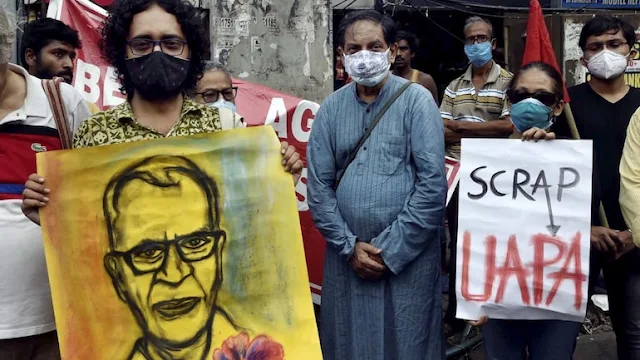Counterview Desk
As many as 172 voluntary organisations have called for country-wide action to “save democracy”. In a statement issued on the eve of the 75th Independence day, August 15, 2021, they insisted on the need to “intensifying the campaign to defend the right to dissent”, and campaign for repeal of the sedition law, the Unlawful Activities Prevention Act (UAPA) and other “repressive" Central and State laws.
Also stating that campaign should focus on restoring the right to bail, the statement demanded “release all political prisoners” and “Justice for Stan Swamy”, who died more than a month ago while he was still an undertrial prisoner.
The demands of this campaign are:
Organisations and networks can organise programmes in this period and on these dates as per their convenience. Please try to share the photos, videos and brief details of the programmes with the social media team on WhatsApp, see telephone numbers at the end of the letter or send to your state or network coordinators on WhatsApp or email (ncddfor2021@gmail.com.) so that these can be shared widely on social media on behalf of the organising groups.
Our hashtags are: #FreedomFromUAPA #FreeAllPoliticalPrisoners #JusticeForFatherStan #RepealUAPA #RestoreRightToBail #NoJailWithoutBail #DraconianLawsQuitIndia
We pledge to campaign for repealing all draconian laws and assert the right to bail of every citizen.
We believe that the right to question and the right to dissent are the foundation of our democratic, secular and socialist republic.
We commit to campaign against all ideologies, laws, and state actions that deprive us of the freedoms of speech and opinion, conscience, association, and to non-violent opposition.
---
Click here for the organisations which have have endorsed the statement
As many as 172 voluntary organisations have called for country-wide action to “save democracy”. In a statement issued on the eve of the 75th Independence day, August 15, 2021, they insisted on the need to “intensifying the campaign to defend the right to dissent”, and campaign for repeal of the sedition law, the Unlawful Activities Prevention Act (UAPA) and other “repressive" Central and State laws.
Also stating that campaign should focus on restoring the right to bail, the statement demanded “release all political prisoners” and “Justice for Stan Swamy”, who died more than a month ago while he was still an undertrial prisoner.
Text:
State repression and attacks on right to dissent and the Constitution are growing. UAPA, NIA and other draconian laws are being used as instruments of repression. More than 170 organisations and civil society networks are undertaking a country wide action campaign (August 15-28) to protest against the institutional murder of Stan Swamy and the repression. As part of this campaign, programmes were organised across the country on July 23 and August 9.The demands of this campaign are:
- Justice for Stan Swamy,
- Repeal of UAPA, sedition and all other draconian Central and State laws.
- Restore the right to bail,
- Release all political prisoners,
- Accountability for filing false cases and compensation to victims, and
- Stop illegal detentions and weaponizing the criminal justice system.
Organisations and networks can organise programmes in this period and on these dates as per their convenience. Please try to share the photos, videos and brief details of the programmes with the social media team on WhatsApp, see telephone numbers at the end of the letter or send to your state or network coordinators on WhatsApp or email (ncddfor2021@gmail.com.) so that these can be shared widely on social media on behalf of the organising groups.
Our hashtags are: #FreedomFromUAPA #FreeAllPoliticalPrisoners #JusticeForFatherStan #RepealUAPA #RestoreRightToBail #NoJailWithoutBail #DraconianLawsQuitIndia
Pledge for August 15, 2021
On the occasion of the 75th Independence Day on August 15, we pledge to defend the legacy of our Freedom Movement, the spirit of the Preamble and the values of our Constitution.We pledge to campaign for repealing all draconian laws and assert the right to bail of every citizen.
We believe that the right to question and the right to dissent are the foundation of our democratic, secular and socialist republic.
We commit to campaign against all ideologies, laws, and state actions that deprive us of the freedoms of speech and opinion, conscience, association, and to non-violent opposition.
---
Click here for the organisations which have have endorsed the statement


Comments